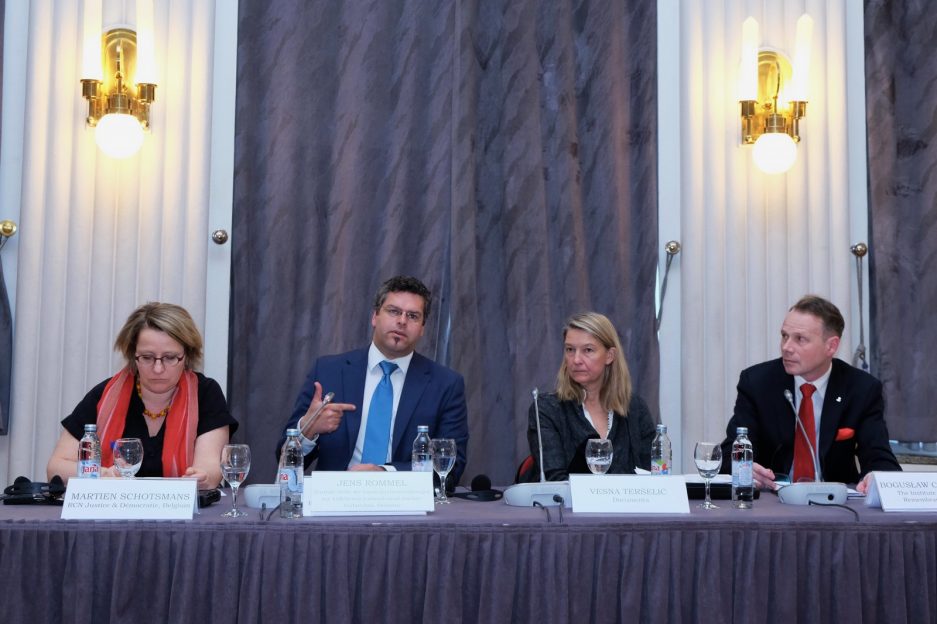Apel za pravdu, utvrđivanje činjenica i pamćenje / 24. ožujka 2017.

APEL ZA PRAVDU, UTVRĐIVANJE ČINJENICA I PAMĆENJE /
U povodu Međunarodnog dana prava na istinu o teškim povredama ljudskih prava i za dostojanstvo žrtava, podsjećamo na neispunjene obaveze vladinih institucija prema žrtvama i preživjelima kao i svim građanima i građankama Republike Hrvatske opterećenim nasilnim nasljeđem nezavršenih ratova. Pozivamo na:
Dokumentiranje sudbine ubijenih i nestalih
- Pozivamo na objavu podataka o imenima i okolnostima stradanja ubijenih. podataka o imenima i okolnostima stradanja ubijenih. Ministarstvo branitelja izdalo je četiri izdanja Knjiga osoba nestalih na području Republike Hrvatske sa imenima svih za kojima tragaju obitelji i porodice s obje strana rata, što je dobar temelj koji će, držimo, trebati dovršiti potrebnim istraživanjima. Iz tog razloga pozivamo Ministarstvo da prilagodbom programa korištenog za Registar branitelja objave zbirne podatke o stradalima i tako omoguće pristup podacima svima.
Rasvjetljavanje sudbine svih nestalih u ratu
- Potrebno je ubrzati rasvjetljavanje sudbine nestalih u ratu kroz povećanje učinkovitosti rada, kapaciteta i proračuna Uprave za zatočene i nestale te poboljšanje regionalne suradnje.
Procesuiranje ratnih zločina
- S obzirom da je pravo svih žrtava ratnih zločina utvrđivanje činjenica i okolnosti njihova stradavanja, očekujemo učinkovitiji rad policije i DORH-a u istraživanju a sudova u nepristranom procesuiranju svih ratnih zločina. Broj neprocesuiranih zločina, za koje nije pokrenuta niti istraga, još je uvijek (pre)velik. Potrebna je daljnja revizija optužnica podignutih u ranijem periodu, dodatne istrage, te suradnja s članovima obitelji ubijenih.
Razvoj sustava podrške žrtvama i svjedocima
- Sustav podrške koje je zaživio na nekoliko sudova i uvelike humanizirao rad pravosuđa treba poboljšati otvaranjem ureda za pružanje podrške svjedocima i žrtvama kaznenih djela na svim županijskim i općinskim sudovima.
- Smatramo nužnim proširiti sustav podrške i u državno odvjetništvo i policiju.
Odgovornost države i naknade štete
- Vlada Republike Hrvatske treba žurno dopuniti Uredbu o kriterijima, mjerilima i postupku za odgodu plaćanja, obročnu otplatu duga te prodaju, otpis ili djelomičan otpis potraživanja kako bi se Republika Hrvatska odrekla naplate parničnih troškova od svih tužitelja koji su žrtve rata a nisu uspjeli sa zahtjevima za naknadom štete.
- Hrvatski sabor treba usvojiti izmjene i dopune sljedećih zakona kako bi se osiguralo obeštećenja za civilne žrtve rata bez obzira na nacionalnost, etničko porijeklo i dr. ukidanjem diskriminatornih definicija: Zakon o odgovornosti za štetu nastalu uslijed terorističkih akata i javnih demonstracija (naknada materijalne štete), Zakon o odgovornosti RH za štetu uzrokovanu od pripadnika hrvatskih oružanih i redarstvenih snaga tijekom Domovinskog rata (teret dokazivanja tužitelja, računanje zastarnih rokova) i Zakon o zaštiti vojnih i civilnih invalida rata
- Potrebno je donijeti nacionalni program i zakon o osnivanju fonda za obeštećenje svih civilnih žrtava rata kojim bi se naknada štete uredila u skladu s Temeljnim načelima i smjernicama o pravu na pravni lijek i reparaciju za žrtve teških kršenja međunarodnih ljudskih prava i ozbiljnih povreda međunarodnog humanitarnog prava UN-a.
Pristup dokumentaciji značajnoj za suočavanje s prošlošću
- U prijedlogu Zakona o arhivskom gradivu i arhivima, koji bi trebao biti usvojen do kraja godine, bilo bi važno predvidjeti rok od 20 godina, umjesto sadašnjih 30, nakon kojih gradivo treba postati dostupno javnosti. To bi javnosti otvorilo i pristup dokumentaciji vezanoj za period do završetka mirne reintegracije. U raspravu o paketu zakona koji, uz već spomenuti, uključuje i Zakon o tajnosti podataka, Zakon o zaštiti osobnih podataka, Zakon o pravu na pristup informacijama te relevantne uredbe treba osim stručnjaka – arhivista, uključiti i stručnjake iz drugih područja i širu javnost jer se pitanje arhiva tiče svih državljana.
Razvijanje uključive kulture pamćenja i stvaranje preduvjeta za obrazovanja za suočavanje s prošlošću
- Vlada treba ukloniti ustaški pozdrav “Za dom spremni“ s ploče u Jasenovcu, gdje je u Drugom svjetskom ratu ubijeno više od 83.000 osoba samo zato što su bili Srbi, Židovi, Romi ili antifašisti.
- Dobra praksa razvijena u pripremi novog postava Memorijalnog centra Lipa pamti pripremljenog uz podršku Primorsko-goranske županije i Europske unije može biti inspiracija za sve. Nadležne vladine institucije dužne su razvijati modalitete suradnje s školama kako bi Spomen područje Jasenovac i druga mjesta pamćenja poput počelo posjećivati puno više od sadašnjih nekoliko desetaka škola godišnje. Spomen područje Jasenovac u 2016. godini posjetio je ukupno 12 661 posjetitelj. Od tog broja, ukupno 7 297 posjetitelja bilo je iz Hrvatske, a 5 364 iz stranih država. Spomen područje je organizirano posjetilo samo 7 osnovnih i 6 srednjih škola.
- Na drugim mjestima stradanja, primjerice Golom otoku slične posjete nisu moguće jer nisu uređena na primjeren način. Početkom lipnja prošle godine donesena je odluka Konzervatorskog odjela u Rijeci, Uprave za zaštitu kulturne baštine, Ministarstva kulture i njihovo rješenje o preventivnoj zaštiti Golog otoka. Usprkos tome nastavlja se daljnja devastaciju preostalih objekata i planira izgradnju unutar zaštićenog područja, umjesto da se izdvoje proračunska sredstava za zaštitu i razvoj programa kulture pamćenja utemeljene na načelima uključivosti, nenasilja i dijaloga kao i kvalitetnije korištenje europskih programa posvećenih sjećanju na sve žrtve.
- Neophodno je i da Ministarstvo znanosti i obrazovanja u suradnji s Ministarstvom kulture stvori preduvjete za učenje o nasljeđu drugog svjetskog rata i političkog nasilja u vrijeme jugoslavenskog socijalizma kroz poticanje inovativne nastave povijesti i kroz istraživački rad na osjetljivim temama iz zavičajne povijesti, ali i jačanje svijesti o nasilnom naslijeđu.
Podrška regionalnoj suradnji i osnivanju REKOM-a
- Sve nadležne institucije trebaju dosljedno osnaživati i jačati regionalnu suradnju u svim pravnim aktima u vezi procesuiranja ratnih zločina te utvrđivanja činjenica o svim žrtvama rata
- Ministarstvo kulture koje je do sada podržavalo pripreme novog postava u Državnom muzeju Auschwitz Birkenau treba izdvojiti proračunska sredstva neophodna za realizaciju izložbe u suradnji s ministarstvima kulture dugih post-jugoslavenskih zemalja.
- Vlada RH treba pokrenuti proceduru za osnivanje Regionalne komisije za utvrđivanje činjenica o svim žrtvama rata (REKOM) u suradnji s vladama drugih post-jugoslovenskih zemalja.
Documenta danas i sutra, 24. i 25. ožujka 2017., u Novinarskom domu u Zagrebu organizira konferenciju pod nazivom “Otpor nasilju i zagovaranje pravde, utvrđivanja činjenica i razvijanja kulture pamćenja” i pozivamo sve zainteresirane da nam se pridruže.
Documenta – Centar za suočavanje s prošlošću









